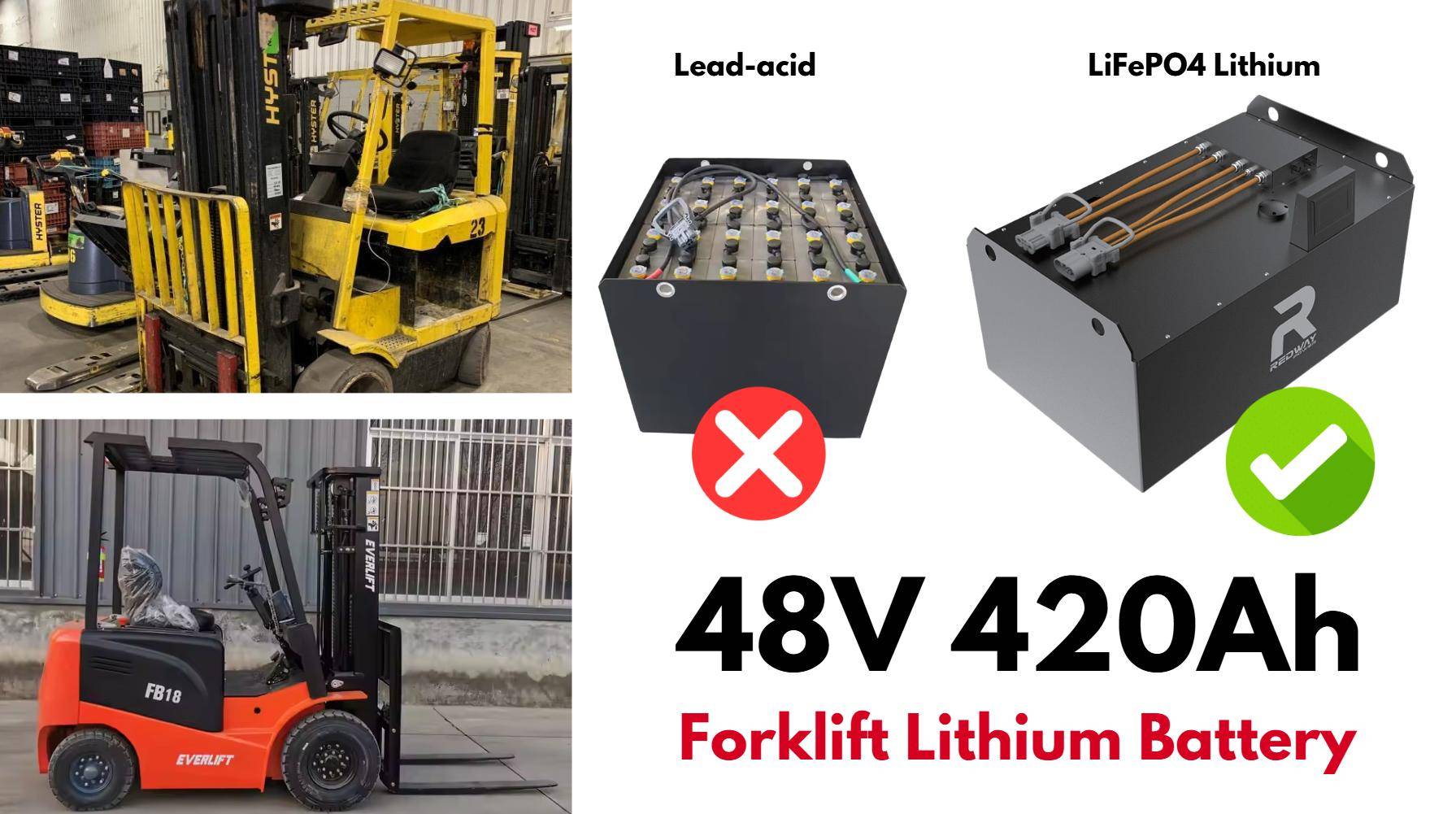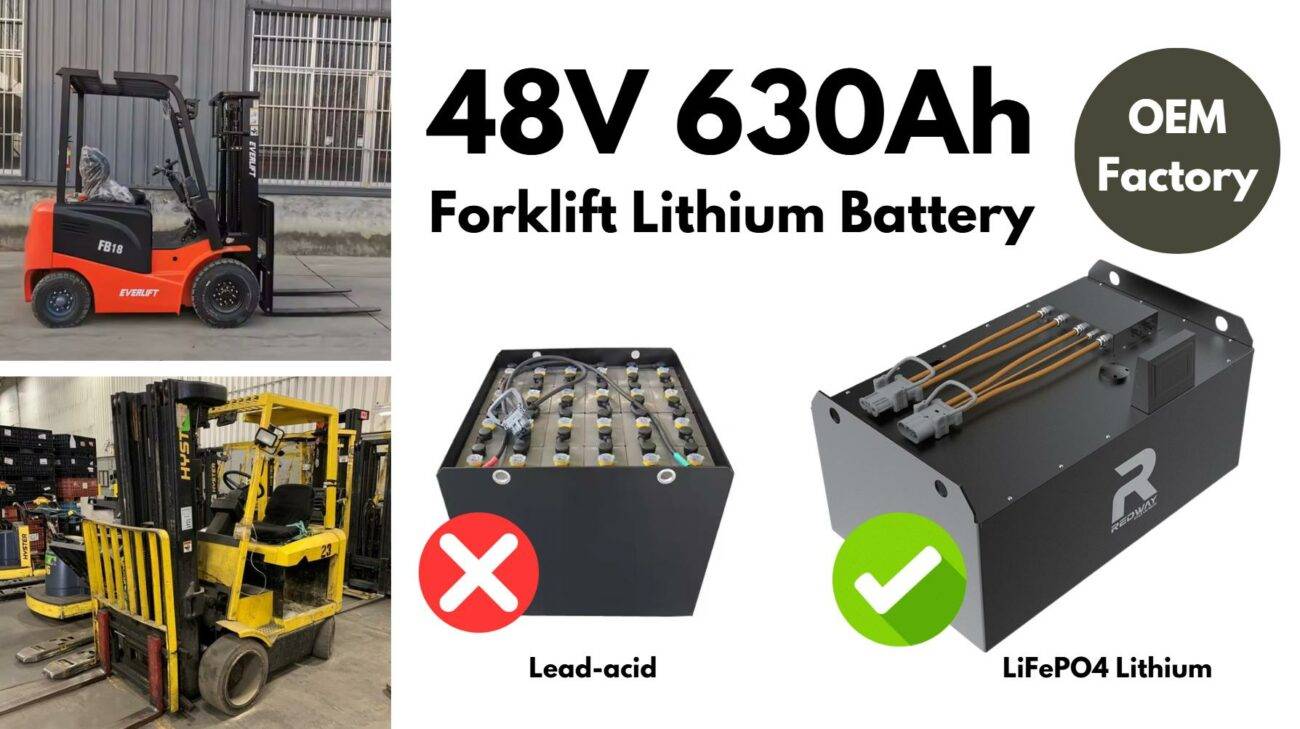
Blog
Best for ISO-Certified Facilities, Redway 48V 420Ah Forklift Lithium Battery

The 48V 420Ah forklift lithium battery offers 30% faster charging, 5,000+ cycles, and 98% energy efficiency. Unlike lead-acid batteries, it maintains stable voltage under heavy loads, reducing downtime. Its modular design allows easy scalability for high-demand facilities, while lightweight construction lowers energy consumption by 15–20%, aligning with ISO 50001 (energy management) guidelines.
LiFePO4 Forklift Batteries OEM Manufacturer
For facilities operating multiple shifts, Redway’s battery enables opportunity charging during breaks without damaging cell longevity. In automotive manufacturing plants, this translates to uninterrupted 24/7 operations with 2-hour full recharge cycles. The battery’s low self-discharge rate (3% monthly) also makes it ideal for seasonal warehouses requiring reliable cold starts. Third-party tests show 12% faster acceleration in electric forklifts compared to legacy systems, directly improving pallet-handling speeds.
| Metric | Redway 48V 420Ah | Lead-Acid Equivalent |
|---|---|---|
| Daily Operating Hours | 22-24 hours | 14-16 hours |
| Energy Cost/Month | $130 | $420 |
| Temperature Range | -4°F to 131°F | 32°F to 104°F |
Which Industries Benefit Most from Redway’s ISO-Compliant Battery?
Pharmaceuticals, food processing, and automotive manufacturing rely on Redway’s battery for zero-emission operations and precision performance. For example, a Toyota-certified warehouse reported a 40% productivity boost after switching. ISO-certified cold storage facilities also use it for consistent power in sub-zero environments.
48v Lithium Forklift Batteries
Electronics manufacturers particularly benefit from the battery’s EMI-free operation, which prevents interference with sensitive assembly robotics. In pharmaceutical cleanrooms, the absence of hydrogen emissions eliminates contamination risks during vaccine production. Logistics centers using automated guided vehicles (AGVs) have recorded 92% fleet uptime due to the battery’s precise state-of-charge monitoring. A Nestlé distribution hub reduced battery changeover time by 70% through modular swapping compatible with AS/RS systems.
| Industry | Key Benefit | Performance Gain |
|---|---|---|
| Automotive | 24/7 Production | 40% Output Increase |
| Pharma | Zero Emissions | 100% Compliance |
| Food Processing | Moisture Resistance | 60% Downtime Reduction |
What Long-Term Cost Savings Does Redway’s Battery Offer?
Despite a higher upfront cost, the battery reduces expenses by 50% over 10 years. Its 10-year lifespan eliminates frequent replacements, while 95% recyclability cuts disposal costs. Predictive maintenance alerts lower downtime expenses, delivering ROI within 2–3 years for high-throughput facilities.
Energy-intensive operations save $18,000 annually through reduced cooling needs – lithium batteries emit 78% less heat than lead-acid alternatives. Facilities also avoid $12,000/year in acid spill containment systems. A Maersk logistics center reported $2.4M savings across 8 years through eliminated battery watering and equalization staffing. The table below outlines typical 10-year costs:
| Cost Factor | Redway Lithium | Lead-Acid |
|---|---|---|
| Energy | $21,600 | $50,400 |
| Replacements | $0 | $48,000 |
| Maintenance | $4,200 | $16,800 |
“Redway’s 48V 420Ah forklift lifepo4 battery isn’t just a product—it’s a commitment to global standards. Our integration of AI-driven BMS and ethical sourcing ensures clients meet ISO benchmarks while achieving 20–30% operational efficiency gains.”
— Dr. Elena Torres, Senior Battery Engineer, Redway
Best for ISO-Certified Facilities Lithium Battery
For ISO-certified facilities, the best lithium batteries are those that offer reliable performance, high efficiency, and safety compliance with global standards.
ISO-certified facilities require batteries that meet strict quality, safety, and environmental standards. Lithium batteries are ideal because they offer better efficiency, longer lifespan, and faster charging times compared to traditional lead-acid batteries. Additionally, lithium batteries are lightweight and provide more consistent power, making them suitable for high-demand industrial applications. They must also comply with safety standards, ensuring thermal management, overcharge protection, and battery management systems (BMS). ISO-compliant lithium batteries must undergo rigorous testing, ensuring their reliability and durability in demanding environments. Batteries from brands like Redway and Lithionics offer customizable solutions for high voltage applications and are widely used in ISO-compliant settings such as data centers, manufacturing plants, and hospitals. The combination of performance and safety makes lithium-ion technology the best choice.
Why are Lithium Batteries Ideal for ISO-Certified Facilities?
Lithium batteries are ideal for ISO-certified facilities due to their reliability, consistency, and safety features.
ISO-certified facilities demand reliable and high-performance energy storage systems. Lithium batteries provide superior efficiency in terms of energy density and lifespan compared to traditional lead-acid batteries. These high-energy-density batteries require less maintenance, reducing downtime and increasing overall productivity in industrial environments. The battery management system (BMS) incorporated in lithium-ion batteries ensures safe operation, monitoring for conditions such as overcharging, overheating, and short circuits. These safety features align with ISO standards that focus on reliable power delivery and environmental sustainability. Additionally, lithium batteries have a longer lifespan and better thermal performance, making them ideal for mission-critical applications where reliability is essential. Their ability to withstand demanding temperatures and high cycles means they can operate efficiently without degradation, ensuring continuous operations in ISO-certified facilities.
How to Choose the Best Lithium Battery for ISO-Certified Facilities
To choose the best lithium battery for an ISO-certified facility, prioritize reliability, certifications, and tailored energy solutions.
When selecting a lithium battery for an ISO-certified facility, focus on those that offer high efficiency, meet industry standards, and comply with safety certifications such as UL and CE. Ensure that the lithium battery is specifically designed for the operational needs of the facility, whether it’s for backup power, energy storage, or electric vehicle charging. Look for batteries with integrated management systems (BMS), which provide safety features such as voltage regulation, thermal protection, and charge management. Additionally, consider the warranty and service support provided by the manufacturer to ensure long-term reliability. Customizable voltage configurations and scalability are important for facilities with growing energy demands. For critical applications like healthcare or data centers, choose a high-cycle life lithium battery that can deliver continuous performance and withstand fluctuations in temperature and load without compromising efficiency.
What Are the Key Features of Lithium Batteries for ISO-Certified Facilities?
Key features of lithium batteries for ISO-certified facilities include high energy density, safety compliance, and long lifespan.
ISO-certified facilities require energy storage solutions that are reliable, safe, and efficient. Lithium batteries excel in this regard due to their high energy density, which means they can store more power in a smaller space compared to traditional batteries. This makes them ideal for facilities where space is limited but performance is critical. In addition, lithium batteries are equipped with a Battery Management System (BMS), which ensures the safe operation of the battery by monitoring parameters like voltage, current, and temperature. This compliance with safety standards is crucial for meeting ISO certifications. Lithium-ion batteries also boast a long lifespan, often lasting 5 to 10 years or more, which is a significant advantage over lead-acid batteries. With low maintenance needs, better performance over a range of temperatures, and the ability to handle high discharge rates, these batteries are perfect for demanding ISO-certified environments.
Which Lithium Battery Brands Are Best for ISO-Certified Facilities?
Leading lithium battery brands for ISO-certified facilities include Redway, Lithionics, and BYD, known for their reliability and compliance.
For ISO-certified facilities, it’s crucial to select batteries from reputable brands that adhere to global safety standards and provide high-performance solutions. Redway is a notable brand, offering customized lithium-ion battery solutions for high voltage applications, providing tailored energy storage options for industrial sectors. Lithionics also delivers advanced battery systems designed to meet ISO requirements with a focus on longevity and safety. BYD, a global leader in renewable energy and electric vehicle batteries, provides solutions designed for both large-scale and high-demand applications, ensuring durable, efficient power. These brands offer batteries with high energy density, battery management systems, and strong service support, ensuring compliance with ISO standards for industrial reliability and environmental safety.
FAQs
- Is the Redway battery compatible with all forklift models?
- Yes, it supports most 48V forklifts, including Toyota, Crown, and Hyster models. Custom configurations are available.
- What warranty does Redway offer?
- A 5-year full warranty covers defects and performance issues, extendable to 10 years with maintenance plans.
- How is the battery recycled?
- Redway partners with certified e-waste recyclers to recover lithium, cobalt, and copper, achieving 95% material reuse.
What are the best ISO-certified facilities for lithium batteries?
Facilities like Microvast Holdings and Ultralife Corporation are notable for their ISO certifications, ensuring high-quality lithium-ion battery manufacturing.
What ISO certifications are relevant for lithium battery manufacturing?
Relevant certifications include ISO 9001 for quality management, ISO 14001 for environmental management, and ISO 45001 for occupational health and safety.
Why are ISO certifications important for lithium battery manufacturing?
ISO certifications enhance credibility, ensure compliance with international standards, and improve operational efficiency in the competitive lithium battery market.
Know more:
Best for ISO-Certified Facilities, Redway 48V 420Ah Forklift Lithium Battery
Best for Eco-Friendly Operations, Redway 24V 210Ah Forklift Battery (Pallet Jack)
Best Certified and Reliable for Safety-Critical Industries, Redway 48V 460Ah Forklift Lithium Battery
Best for Food Hygiene, Redway 36V 240Ah Forklift Lithium Battery
Best for Auto Mfg, Redway 72V 300Ah Forklift Li Battery
Best for Solar Storage, Redway 48V 630Ah Forklift Lithium Battery




